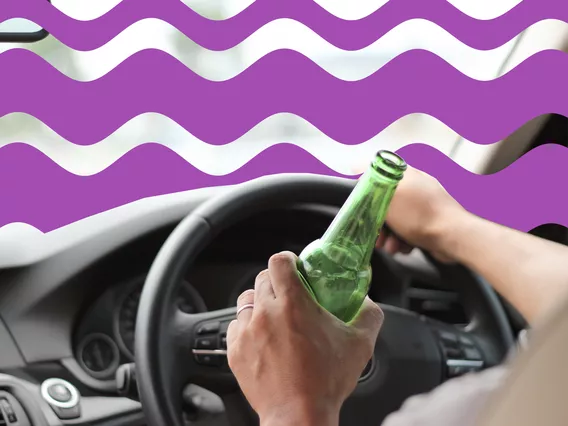A DUI — sometimes called a DWI — is a legal charge for driving under the influence or driving while intoxicated/impaired. DUI charges indicate a driver has a blood alcohol content level above the legal limit. These charges can also refer to driving under the influence of recreational or prescription drugs.
Driving under the influence is extremely dangerous. Someone is killed in a drunk-driving accident every 45 minutes in the U.S., and around 11,000 people die in these accidents annually.[1]
Table of contents
- DUI legal definition
- What “driving under the influence” means
- DUI statistics in the U.S.
- The consequences of a DUI conviction
- DUI FAQs
DUI legal definition
The exact legal definition of a DUI or DWI depends on the state, but generally speaking, they are laws that make driving while impaired by drugs or alcohol a criminal offense.
DUI laws have a BAC (blood alcohol concentration) limit attached to them. Any driver found with a BAC at or above that limit can be charged with a DUI or DWI. All but one state, plus Washington, D.C., and Puerto Rico, have BAC limits of 0.08. Utah’s limit is even lower, at 0.05.
The terms DUI and DWI are often used interchangeably, though some states may consider them separate offenses.
Learn More: The Best Cheap Car Insurance After a DUI
What “driving under the influence” means
Driving under the influence means a person is operating a vehicle while intoxicated or impaired by alcohol, a drug, or an illegal substance. To fully understand the meaning of this, it’s important to examine what exactly “operating a vehicle” means, how laws define “under the influence,” and what drugs and substances fall under that purview.
Operating a vehicle
The exact wording of DUI laws varies state by state, but to “operate a vehicle” means to be in physical control of a vehicle — or, as Texas law explains it, “a device in, on, or by which a person or property is or may be transported or drawn on a highway” — in a public place.
Many times, “operating a vehicle” also includes driving a boat, an airplane, or another mode of transportation. Some state laws separate DUI charges by mode of transportation. For example, boating while intoxicated, or BWI, is a separate criminal offense in Texas.
Under the influence
“Under the influence” means that recent use of alcohol or recreational or prescription drugs has impaired a driver’s normal faculties. In Florida, this even includes nitrous oxide, and in Illinois, medical marijuana qualifies.
In terms of alcohol, every state sets a blood alcohol concentration (BAC) level that amounts to being “under the influence of alcohol” in that jurisdiction. Any person found to have a BAC of that level or higher is considered legally intoxicated. In most states, the BAC limit is 0.08.[2]
DUI/DWI laws by state
Every state has its own laws regarding driving under the influence, and they also have different names for these charges. Most often, DUI or DWI is used, but in some states, it may also be OVI (operating a vehicle impaired), OWI (operating while intoxicated), or OMVI (operating a motor vehicle impaired).
Here’s a look at how the laws break down by state and what each state calls it.
| State | What It’s Called | BAC Limit |
|---|---|---|
| Alabama | DUI | 0.08 for drivers 21 and older 0.02 for bus drivers and drivers younger than 21 0.04 for commercial drivers |
| Alaska | DUI | 0.08 for drivers 21 and older 0.02 for drivers younger than 21 0.05 for commercial drivers |
| Arizona | DUI | 0.08 for drivers 21 and older 0.02 for drivers younger than 21 0.05 for commercial drivers |
| Arkansas | DWI, BWI, DUI, BUI | 0.08 for drivers 21 and older 0.02 for drivers younger than 21 |
| California | DUI | 0.08 for drivers 21 and older 0.01 for drivers younger than 21 0.04 for commercial and taxi/Uber drivers |
|
| ||
|
| ||
|
| ||
|
| ||
|
| ||
|
| ||
|
| ||
|
| ||
|
| ||
|
| ||
|
| ||
|
| ||
|
| ||
|
| ||
|
| ||
|
| ||
|
| ||
|
| ||
|
| ||
|
| ||
|
| ||
|
| ||
|
| ||
|
| ||
|
| ||
|
| ||
|
| ||
|
| ||
|
| ||
|
| ||
|
| ||
|
| ||
|
| ||
|
| ||
|
| ||
|
| ||
|
| ||
|
| ||
|
| ||
|
| ||
|
| ||
|
| ||
|
| ||
|
| ||
|
| ||
|
|
Compare Car Insurance Quotes Instantly
Enter your ZIP codeGet my quotesDUI statistics in the U.S.
DUIs are quite common in the U.S. Insurify data shows that more than 2% of all U.S. drivers have DUIs, and in some states, as many as 5% have a DUI on their record.
More than 11,000 people were killed in drunk driving accidents in 2020 — accounting for about 30% of all traffic deaths in the country. Nearly 230 children were among those deaths.[3]
The consequences of a DUI conviction
Many consequences come with a DUI charge. There may be jail time and fines, and you may have your driver’s license revoked. In West Virginia, for example, potential jail times vary from 24 hours to 10 years, depending on the offender’s age, BAC, and any injuries that occur due to their impaired driving. Fines range from $25 to $5,000.
In Texas, fines range from $2,000 to $10,000, you can face up to 10 years in prison, and you may lose your license for up to two years.
Many states revoke licenses for minors and adults with high BACs or previous offenses. Some states also require DUI offenders to install ignition interlock devices in their cars. Ignition interlock devices require the driver to give a breath sample before the car can be turned on. If the device detects any alcohol, it won’t start.
A DUI charge usually remains on your driving record for five to 10 years, depending on state laws where you live. In some cases, it may remain on your record permanently.
How a DUI increases car insurance premiums
Having a DUI on your record can increase your car insurance premiums — and often quite a bit. Insurify data shows that a DUI can increase your car insurance premiums by almost 100%.
Some car insurance companies may choose not to renew your policy once you get a DUI, as it indicates you’re a higher-risk driver. If this happens, shop around with other insurers. Some may still offer coverage. You can also consider using public transportation until you can get insurance.
Additionally, you may need to ask your current insurer for an SR-22 form, which proves to the state you have the legally required minimum insurance after your DUI. You may need to have an SR-22 on file for a few years, depending on your state.
DUI FAQs
Here are answers to some commonly asked questions about DUIs.
-
What’s the difference between a DUI, an OWI, and a DWI?
Every state has its own laws regarding impairing driving. Some refer to it as driving under the influence (DUI), operating while intoxicated (OWI), or driving while intoxicated (DWI). The exact charge you can face depends on what state you’re in when committing the offense.
-
What’s the difference between a DUI and impaired driving?
These terms are often used interchangeably, though it depends on the laws in your state. Some states may use “impaired” to indicate a lesser level of intoxication and less severe penalties.
-
What’s a DUI safety corridor?
A DUI safety corridor is a portion of a highway or state road that is known to have a high rate of DUI-related accidents with fatalities or serious injuries. As a result, law enforcement usually has a higher presence on these stretches of road. These corridors may also come with increased fines for offenders.
-
How long do DUIs and DWIs stay on your driving record?
This depends on the state you were charged in. In Delaware, a DUI stays on your record for at least five years. In some states, you may be able to have the DUI expunged from your record. Ask a lawyer in your state if this is something you’re considering.
-
Will you go to jail if you receive a DUI or DWI?
You could go to jail for getting a DUI or DWI. The exact penalty will depend on your state, age, BAC, and previous convictions. In Texas, first-time offenders can get three to 180 days of jail time. But repeat offenders face up to 10 years in prison.
Compare Car Insurance Quotes Instantly
Enter your ZIP codeGet my quotesSources
- Drunk Driving. "Drive Sober or Get Pulled Over." Accessed February 1, 2023
- National Highway and Traffic Safety Administration. "Drunk Driving." Accessed February 1, 2023
- Centers for Disease Control. "Impaired Driving: Get the Facts ." Accessed February 1, 2023





